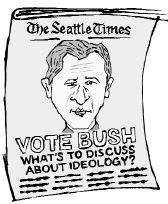The Seattle Times‘ October 22 endorsement of George W. Bush for President was not nearly the surprise that its liberal editorial writers seemed to think it was. Instead, it was a revealing glimpse into the America that the Times represents and reports on: fat, happy, and without a care in the world.
Reasonable people, even in a one-party city like Seattle, can have differing political views. But the rationales given by the Times for its Bush endorsement were astonishing because they had little or nothing to do with the actual public policy decisions Bush or Gore—or, for that matter, Nader or Buchanan or Browne or McReynolds—would make. Billions of people around the world feel the consequences of the decisions made by an American president and his (for the time being, it’s still always his) advisors, and the Times is screwing around awarding endorsements for style. That’s media arrogance in action.
Mindy Cameron, Times editorial page editor, writes that in evaluating leaders, “ideology, whether right or left, is not much of a factor. What’s to discuss about ideology?” Well, nothing, when the two wings of our ruling corporate party play the entire football game between the 10 and 20 yard lines. Nothing, when you use and perpetuate futile distinctions between left and right when the real separation in America and the world is between top and bottom—and when the top, ably served by the Times, accepts its dominance as a God-given right. There’s nothing to discuss; the policies embraced by both Gore and Bush give us, domestically, a quarter of the world’s prison population and, abroad, extension of the Monroe Doctrine of colonial days to enforce American will in every corner of the world and even into space. It is a brutal arrangement for most of the world’s population, and it is an utter betrayal of the dreams of democracy and freedom we’re fed as children. Ideology doesn’t matter when your rogue superpower has its foot on the neck of the world.
These realities are rarely reported and never analyzed by the comfortable folks at the Times, who can afford not to worry because they don’t feel the dire consequences; instead, they—like many of us—very much reap the benefits of America ܢer Alles. What our empire does to the disenfranchised is of no great concern—people don’t want to read about it, and the Times, like most American news outlets, doesn’t want to discuss it. In the same day’s paper, Times executive editor Michael B. Fancher wrings his hands for 22 tortuous paragraphs over the Times‘ coverage of the Israel/Palestine conflict, without once mentioning the United States’ role in perpetuating the bloodshed as the world’s primary enabler of Israel’s illegal occupations. It’s simply taken for granted. Who needs censorship?
It is complacency that allows editorial boards to focus on cosmetic issues like “integrity” and “civility” (cited by the Times in its Bush editorial) rather than on the choices their elected leaders make. All elected officials tell voters what they want to hear. In national races, the products being sold are candidates, and their images and speeches are as carefully crafted as any Madison Avenue output. It has not a damned thing to do with how the country is run, and it should be the job of powerful media interests like the Times to take us beyond those images and show us what our leaders are doing for and to us and the world.
Or maybe Frank Blethen just wants the estate tax repealed.
One more comment
Speaking of things that alienate people from politics, it has been particularly depressing this election year to witness the heavy-handed attempts by some Gore supporters to convince the fans of Ralph Nader to ignore their beliefs and go with Gore. Not because I dislike Al Gore; reasonable people, including most of the Weekly‘s editorial staff, can and do like him. But it’s depressing because the message generally isn’t about how good Al Gore is; assertions that Gore has ever undertaken any policies preferred by Nader backers are notably absent. Instead, it’s about how scary George W. Bush is.
True enough, but what the “lesser of two evils” approach does in our deeply cynical society is tell people that they cannot expect good things from politics; they can only brace themselves for betrayal and hope to minimize the damage. Gore may screw us, but, at least, he’s not an idiot; Bush may be an idiot, but, at least, he’s honest. This kind of stuff fuels not only antigovernment initiatives such as I-695, but, more importantly, the decision by the majority of Americans to ignore voting altogether as an irrelevant, fraudulent, futile, or self-destructive exercise. Sadly, many in power are just fine with this arrangement; people who ignore politics don’t object when they get ripped off.
I’m not particularly a fan of Ralph Nader, and his beatification by some leftists has its own dangers. But surely, this country can do better than the two corporatist mediocrities who have been thrown our way by the major parties this year. It’s tempting to say we cannot and that any politician ambitious and corrupt enough to rise to the very pinnacles of power in this country has long since lost touch with the common citizen—or more likely, in the case of scions such as Bush and Gore, they’ve never known one in the first place. Republican and Democrats alike carefully calibrate their policy decisions to contradict as many of their stated beliefs as possible without driving voters into the arms of the opposition. This year, the Democrats are the party of God; the Republicans embrace diversity.
Not only is this kind of treacle dishonest, but it’s a sorry substitute for talking about policy preferences that affect the future of the entire planet. We have four years until we’re subjected to this crap all over again—only probably worse. Let’s get busy trying to create something better.







